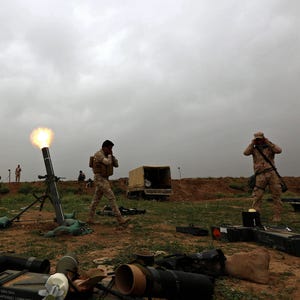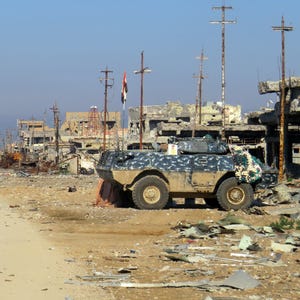MACDILL AIR FORCE BASE, Fla. — The Pentagon is finalizing plans to deploy more American ground forces to support the Iraqi army’s offensive to seal off and retake the Islamic State stronghold in Mosul, top defense officials said.
Both Iraqi and American military commanders have identified specific ways the U.S. military can support the Iraqi-led operation, leading to a high-level Pentagon recommendation for more troops. The plan is soon headed to the White House for approval, said Marine Corps Gen. Joseph Dunford, chairman of the Joint Chiefs of Staff.
"The timing is focused on the next phase of the campaign, which is towards Mosul," Dunford said during a press conference here Wednesday. "Its directly attributable to developing a plan for Mosul, seeing that, coming up with a common plan with the coalition on the ground ... and then figuring out ... what capability will best enable the Iraqi security forces and the [Kudrish] Peshmerga to be successful.
"The president will have an opportunity to make some decision here in the coming weeks."
Dunford declined to say how many additional troops might deploy or what specific capabilities they might bring. Currently, there are 3,870 U.S. personnel authorized for the counter-ISIS mission in Iraq, but defense officials say the total number, including those classified as on “temporary” deployment, is closer to 5,000.
For months U.S. military officials have suggested that the Iraqis might need additional American assistance, including combat advisers to work alongside Iraqi brigade commanders and attack helicopters for close-air support. The Pentagon's new recommendation comes as the Iraqi army is mounting its first major offensive in northern Iraq that is encroaching on Mosul, which fell to ISIS in June 2014.
Operations began March 24, but so far the Iraqis have made little progress despite support from American aircraft and artillery, according to local reports. Iraqi forces launched the operation from a large military base near Makhmour, a Kurdish-controlled city in northern Iraq where the Iraqis have amassed thousands of troops in recent weeks.
The U.S. Marine Corps has established a small artillery outpost nearby to provide fire support for the Iraqi offensive. Those Marines, who are armed with four 155mm M777A2 Howitzer cannons, had named the facility Fire Base Bell. But the title was changed — to the Kara Soar Counter Fire Complex, a move meant to underscore their support role, CNN reported Wednesday — after ISIS rocket fire killed one Marine and wounded eight others on March 19.
ISIS militants have used Hawija as a primary logistics hub for launching attacks in the Kirkuk area, said Rick Brennan, a retired Army officer who served as a senior civilian adviser to military leaders in Iraq from 2006 until 2011. He is now a senior political scientist at the RAND Corporation.
“By moving their forces from Makhmour to Qayyarah," he said, "they will make it make it more difficult for ISIS to get arms and ammunition and resupply [from Mosul] to that area.”
The airfield has the potential to become a major supply hub for U.S. and Iraqi operations throughout northern Iraq. After the U.S. invaded Iraq in 2003, it served as was a brigade headquarters for American forces. The forward operating base there was called FOB Endurance.
"The airfield there is important for helicopter operations," Brennan said.
If successful in seizing Qayyarah, Iraqi and Kurdish forces will have surrounded much of Mosul, blocking many of ISIS’s main routes in and out. It would position the Iraqis to isolate Mosul using a strategy very similar to their approach in retaking Ramadi in December.
“We’ve seen with Iraqi operations, the Iraqi way of fighting is they approach it as a slow strangulation,” Air Force Col. Pat Ryder, a CENTCOM spokesman, said in February. “They will get their isolation force around the city, and they will slowly start to squeeze. And they will continue to do so until that time when they feel they can assault the city and clear it of [ISIS].”
Seizing Qayyarah will require the Iraqi army to cross the Tigris River, logistically an intensive operation that would likely require U.S. support. American troops provided support for a key river crossing in Ramadi in December.
Many U.S. military officials believe it will be next year before the Iraqis finally have enough combat strength — estimated to be between eight and 12 brigades — to launch the definitive invasion Mosul. Qayyarah, about 30 miles south, potentially puts the city within range of American-made ground-based rocket artillery systems. The M142 High Mobility Artillery Rocket System, or HIMARS, is a vehicle-mounted system that fires precision-guided artillery and offers an alternative to air strikes.
Yet Brennan suggested that artillery may not be a decisive element for a Mosul invasion because the Iraqis and their American allies will be very concerned about civilian casualties.
"They're going to have to go in," he said, "door-to- door, in ground operations."



Δεν υπάρχουν σχόλια:
Δημοσίευση σχολίου